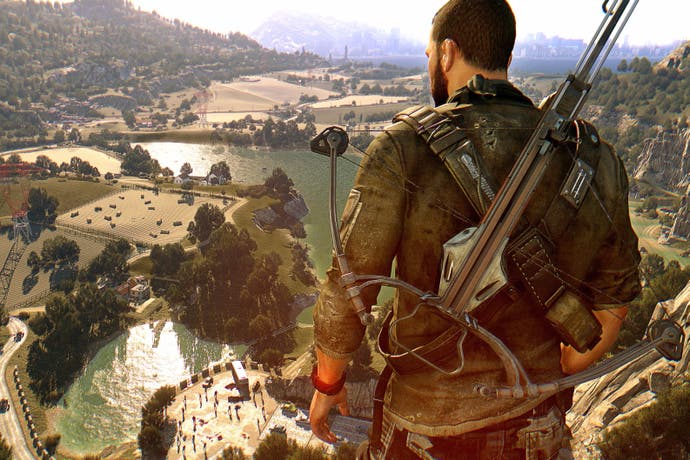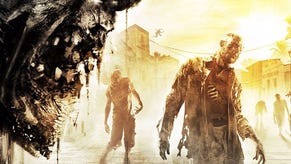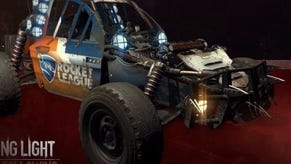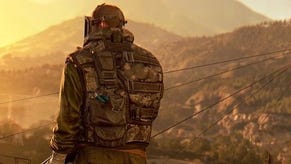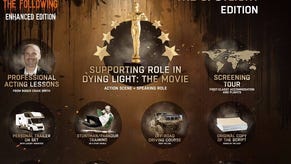Dying Light: The Following review
Parkour and wreckreation.
The original Dying Light was so much fun. Fun in a scrappy, upside-down way. The game hid many of its best qualities behind a skill-tree system that made its headline parkour a shin-grazing drag for hours - until, essentially, you unlocked the skill of 'not being rubbish at parkour'. Because the game dished out XP for every act of mediocre acrobatics - double at night - it gave rise to a compulsive kind of midnight grind, hopping back and forth over a waist-high fence until sunrise. Morning! Halfway to having bendable knees already.
The Following has both learned from Dying Light's slow start and, as evidenced by the fact I spent a full hour spinning violent donuts around zombie-packed wheat fields harvesting XP for the new driving skill tree, also not learned. After a year of DLC and updates, The Following is described by Techland as the game's first expansion - not just more, but, you know, a lot more. Slightly confusingly, it's distinct from the Dying Light: Enhanced Edition - which is both a game of the year release featuring The Following and a series of updates being applied to the original game - although it also includes those enhancements. For now, let's think of it as 'a bit more Dying Light' - new missions, in an all-new map.
This new map is slightly larger than the combined area of Dying Light's original city, although as its defining feature is open space and green countryside it also feels less full. This countryside is specifically tooled to The Following's headline feature: it has a car. And now you have a car, too. As the original game presented you with an urban playground and the (eventual) means to move about it enjoyably, so The Following contains fields and a sparse road network designed to be passed through by tooled-up off-road buggy.
What are we doing here? There's a legitimate question as to whether we should pay attention to anything Dying Light has to say about story, this being the game which contains the immortal line "I'm no leader, I'm a goddam parkour instructor!" But The Following is less operatic - the reason for hero Kyle Crane's flight from the city is word of a cult whose members are immune to the zombie virus. With the city low on medicine, Crane investigates, finding a population of wary survivors in thrall to a rustic sun-worshipping sect led by the masked Mother. His quest paths then echo those of the main game - earn trust by doing tasks from the menial to the traumatically violent, find out what's going on, and incidentally become a monstrous, multi-bladed killing force. With a car.

This last bit is important. Crane's ride is subject to the same anxious impermanence that defines all of Dying Light's gear, which breaks, eventually beyond repair, once it has sliced and stoved its allotted set of zombie bodies. The buggy needs constant refuelling, and is built from five upgradeable parts - traction, brakes, suspension, turbo and engine - which gradually wear out with damage or any driving that could be considered fun. They can be repaired, mostly with screws, which are suddenly more valuable than gold or even Medkits, until they eventually need to be replaced.
This is why the skill tree is so crucial, and the reason for razzing around a field juicing zombies with my fender. The core abilities unlocked through driver levelling enable you to build ever-better car parts, so as they fail you're able to replace them with upgrades and - at some point - to actually enjoy driving the car. See, while maxing out the driving skill tree is significantly speedier than levelling agility or combat in the original game's, The Following still suffers from the same masochistic fun-gating. The untouched buggy is a bit tedious, not just because it doesn't have an explosive electrical trap, mine layer or flamethrower attached, but because the suspension is awful and it corners like a tug boat. It gets better faster this time, but it still starts bad. Which is odd.
In fact, the trajectory of Dying Light is a middle-class success story - starting in the slums of Harran, upgrading to the richer architecture of Old Town, and now, finally, moving out into the country. There's always been lots to love even in the game's boxy, foggily-drawn cityscapes - a rare exoticism (the Middle East as civic environment, rather than warzone, is a collective blind spot) offset wonderfully by the lingering, soured notes of a John Carpenteresque soundtrack. While being out in the open nullifies one of Dying Light's defining strengths, the tactile, palm-slapping traversal of its crowded routes and rooftops, The Following's countryside has its own pleasures: a valley-spanning viaduct, an imposing dam, a mysterious lighthouse. Dying Light has never been great at showing us distance - part of its forgivable scrappiness - but there's still a joy to climbing the highest thing you can see, especially if you're not really meant to, and checking out the view.
The Following's countryside feels, in other words, like the rest of Dying Light, but less compressed. Quests require a buggy dash rather than an urban sprint, and there are hunting towers sprinkles across the map as respawn points to prevent disgruntled post-spawn marching. Perhaps a bigger shift in how the game feels is simply down to the post-game placement of The Following. Kyle Crane is by this stage levelled beyond caring about regular zombies, which can be swished away easily. Even the stronger Virals and nasty night-dwelling Volatiles can be chopped to sleep without much drama. And so The Following shifts emphasis - to bigger enemies, and more firearms.
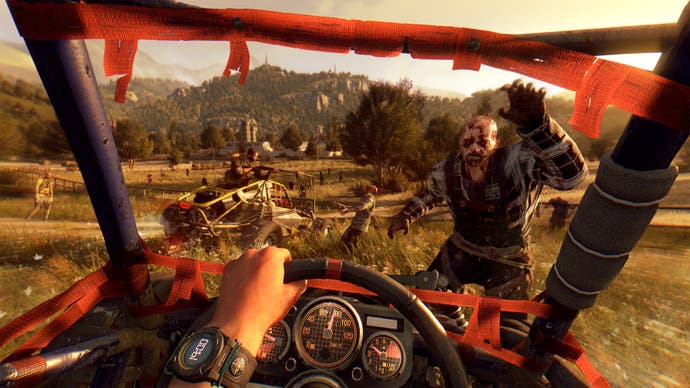
Titanic Goons and Demolishers, once reserved for quest climaxes, are now scattered across the map. There are more gunfights with armed, still-human bandits, and more guns to fight them with. The Following gives us an SMG (as well as making ammo for the existing rifles and handguns more common), and offers quieter options with the new bow and crossbow. Theoretically this introduces the option for Far Cry-like stealth operations, and you can even tag enemies using Crane's survivor sense, but I haven't had a base infiltration yet that didn't end with a couple of crossbow kills followed by a mountain of discarded automatic rounds.
These shifts in combat and difficulty are Techland's way of retooling Dying Light's end-game. Having built a strong community through updates and DLC, it's now giving them something to do. Alongside the new driving skill tree, The Following also introduces Legendary levels (also available, retroactively, to those still exclusively playing the original Dying Light). These offer incremental improvements to Crane's core stats - stamina, damage, health - and an absurd depth, with 250 levels rather than the regular 25. To give you some idea, having played The Following for 16 hours, and having unlocked all 25 driving levels after around ten, I currently have a Legendary rank of just four. This explains why there's a huge Demolisher called Holler on a farm near my central safehouse that hasn't yet registered a single sliver of damage despite considerable and sustained efforts with all of my shiniest guns. I've finished The Following, but there's obviously a long way to go.
Which gets us back to the issue of grinding. The Following has a new XP-rich difficulty setting - Nightmare mode, with various restrictions on stamina and equipment - to ease the journey through the Legendary ranks. But somehow wall-hopping exploits and ram-raiding killing fields feel like an intrinsic part of the Dying Light experience. It's always lacked a certain polish, but its rough patches have always felt as though they might be hiding shortcuts and surprises. There's a thrill to a game whose parameters you're not entirely sure of, and with The Following, Dying Light remains a game full of scrappy possibility.
